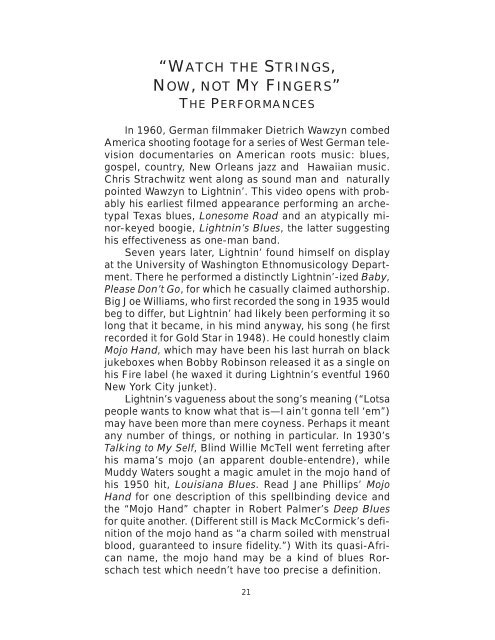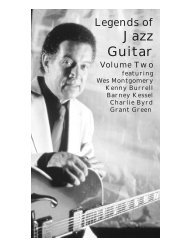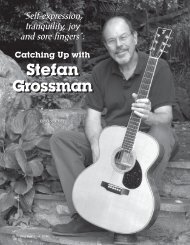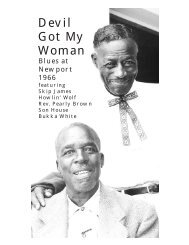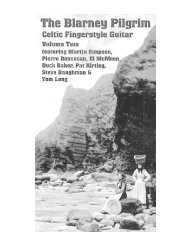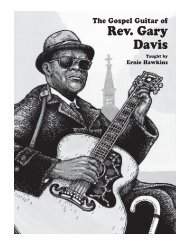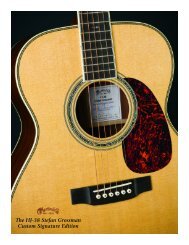Lightnin' Hopkins - Stefan Grossman's Guitar Workshop
Lightnin' Hopkins - Stefan Grossman's Guitar Workshop
Lightnin' Hopkins - Stefan Grossman's Guitar Workshop
You also want an ePaper? Increase the reach of your titles
YUMPU automatically turns print PDFs into web optimized ePapers that Google loves.
“WATCH THE STRINGS,<br />
NOW, NOT MY FINGERS”<br />
THE PERFORMANCES<br />
In 1960, German filmmaker Dietrich Wawzyn combed<br />
America shooting footage for a series of West German television<br />
documentaries on American roots music: blues,<br />
gospel, country, New Orleans jazz and Hawaiian music.<br />
Chris Strachwitz went along as sound man and naturally<br />
pointed Wawzyn to Lightnin’. This video opens with probably<br />
his earliest filmed appearance performing an archetypal<br />
Texas blues, Lonesome Road and an atypically minor-keyed<br />
boogie, Lightnin’s Blues, the latter suggesting<br />
his effectiveness as one-man band.<br />
Seven years later, Lightnin’ found himself on display<br />
at the University of Washington Ethnomusicology Department.<br />
There he performed a distinctly Lightnin’-ized Baby,<br />
Please Don’t Go, for which he casually claimed authorship.<br />
Big Joe Williams, who first recorded the song in 1935 would<br />
beg to differ, but Lightnin’ had likely been performing it so<br />
long that it became, in his mind anyway, his song (he first<br />
recorded it for Gold Star in 1948). He could honestly claim<br />
Mojo Hand, which may have been his last hurrah on black<br />
jukeboxes when Bobby Robinson released it as a single on<br />
his Fire label (he waxed it during Lightnin’s eventful 1960<br />
New York City junket).<br />
Lightnin’s vagueness about the song’s meaning (“Lotsa<br />
people wants to know what that is—I ain’t gonna tell ‘em”)<br />
may have been more than mere coyness. Perhaps it meant<br />
any number of things, or nothing in particular. In 1930’s<br />
Talking to My Self, Blind Willie McTell went ferreting after<br />
his mama’s mojo (an apparent double-entendre), while<br />
Muddy Waters sought a magic amulet in the mojo hand of<br />
his 1950 hit, Louisiana Blues. Read Jane Phillips’ Mojo<br />
Hand for one description of this spellbinding device and<br />
the “Mojo Hand” chapter in Robert Palmer’s Deep Blues<br />
for quite another. (Different still is Mack McCormick’s definition<br />
of the mojo hand as “a charm soiled with menstrual<br />
blood, guaranteed to insure fidelity.”) With its quasi-African<br />
name, the mojo hand may be a kind of blues Rorschach<br />
test which needn’t have too precise a definition.<br />
21


